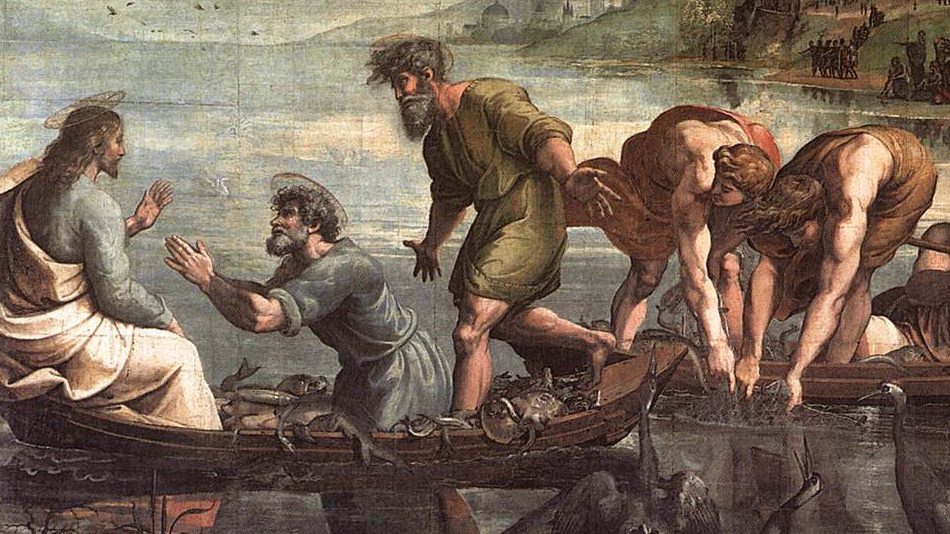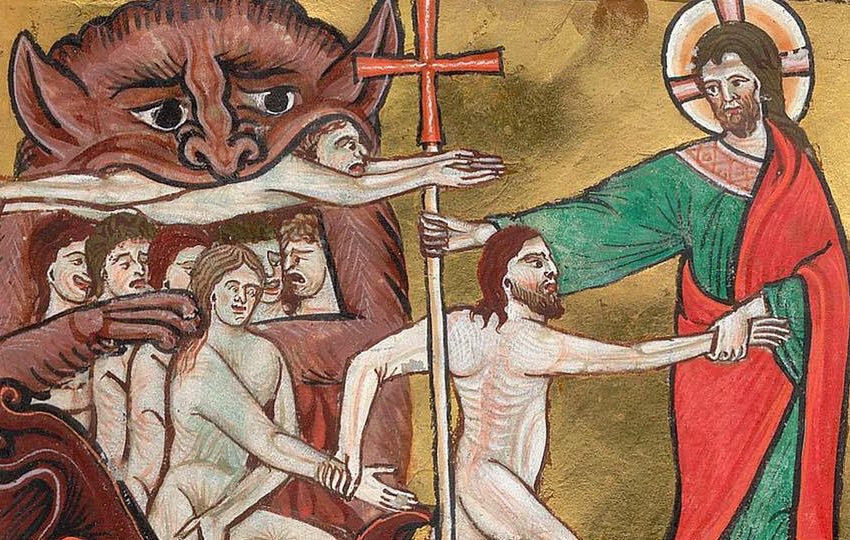We are Witnesses of These Things
3rd Sunday of Easter (C)
This gospel reading contains my teenage son’s favorite scripture verse: “Come, have breakfast” (Jn 21:12). But what I really like about this passage is how it shows the humanity of the Risen Christ. Even in his post-resurrection, glorified state, he engages in very ordinary and physical activities like eating fish with his friends around a charcoal fire by the lake.
The way he gets Peter’s attention also strikes me as very human. Peter and the other disciples have been out fishing all night and caught nothing. Jesus, unrecognized by them, calls from the shore for them to cast their nets one more time. As soon as they do, the nets are miraculously filled to overflowing. It’s then that they recognize Jesus, because this is exactly how Jesus first called Peter and Andrew. Just like now, they had been fishing all night and caught nothing, but at Jesus’ command lowered their nets and caught more fish than their boats could hold (Lk 5:1-11). Now, after rising from death, Jesus chose to surprise Peter with this reenactment of their first meeting, like an inside joke shared between close friends. Jesus must have been smiling the whole time Peter was pulling in the net, waiting for that moment of recognition.
But our Lord was doing something more than affectionately teasing a friend. He was reminding Peter of his mission. That first miraculous catch of fish ended with Jesus commissioning Peter to be a “fisher of men.” Peter left his boat and nets behind and followed Jesus as his disciple for three years. But now, after the passion, death, and resurrection of our Lord, what are Peter and the other apostles doing?
They’ve gone fishing.
Think about all they witnessed: the multiplication of the loaves and fishes; the healing of lepers; sight restored to the blind; the transfiguration of the Lord; the veil of the Temple being torn in two as our Lord hung dying on the cross; the empty tomb and the Risen Christ appearing in their midst, giving them the Holy Spirit, saying, “As the Father has sent me, so I send you” (Jn 20:21). They have a mission and the divine authority to carry out this mission. After all this, what did these Galilean fishermen do? They went back to business as normal. They fell into old patterns. They acted the same as they did before Christ entered their lives.
Sometimes we can forget our own mission as Christians. It’s very easy, after encountering Christ, to return to our usual routine and live our lives as if nothing has changed. Like Peter and the other Apostles, we sometimes need a reminder of our calling.
The vocation of all Christian disciples is “a vocation to holiness and to the mission of evangelizing the world” which is rooted in our participation in the sacraments of Baptism, Confirmation, and the Eucharist — the sacraments of Christian initiation (CCC 1533). In Baptism we die to our old self and rise a new creation in Christ. We become members of his Body, the Church. In Confirmation we are sealed with the Holy Spirit and empowered with divine authority to live our mission of holiness and evangelization. In the Eucharist we are fed on Christ’s own Body and Blood to strengthen and nourish us for this mission. Having done all of this, how can we ever be the same?
But we still look the same. And we still feel the same. Our old habits and ways of thinking don’t simply vanish after receiving a sacrament or going on a retreat. It is easy to go back to our old, familiar ways, like the Galilean fishermen did, especially when the world around us still seems the same. But we are not the same, because the Risen Christ lives within us.
During Mass, before the gospel is proclaimed, we make the sign of the cross over our forehead, mouth, and breast. As we do, we silently pray that the word of God be in our mind, on our lips, and in our heart. Do we mean it? Because if we think about Christ, speak about Christ, love Christ and love what Christ loves, that means we are his witnesses. That’s what we are supposed to be. Are we? When people see us, do they see Christ? When they hear us, do they hear Christ? Do they experience the love of Jesus through our charity?
After being reminded of their mission, the Apostles left Galilee and returned to Jerusalem to be Christ’s witnesses. The book of Acts says they filled the city with their teachings, so much so that the Sanhedrin had them arrested and ordered them to cease. But the Apostles said, “We must obey God rather than men… we are witnesses of these things” and they rejoiced to be found worthy to suffer dishonor for the sake of their Lord. Can we say the same? If Christianity were outlawed today, would there be enough evidence to convict us? Would we rejoice to be persecuted for his sake?
If the answer is no, don’t despair. Even the Apostles lost sight of their mission at first. But Jesus comes to us, as he came to his friends then, to remind us that we are not who we were before. He comes to us through the sacraments, in the scriptures, and in our prayer, asking us, as he asked Peter, “Do you love me?” He asked Peter three times, because Peter denied him three times. He will ask us as many times as necessary. If we answer “yes, Lord, you know that I love you,” he will call us back to our mission, no matter how far we have strayed. “Be my witness,” he will say. “Follow me.”



